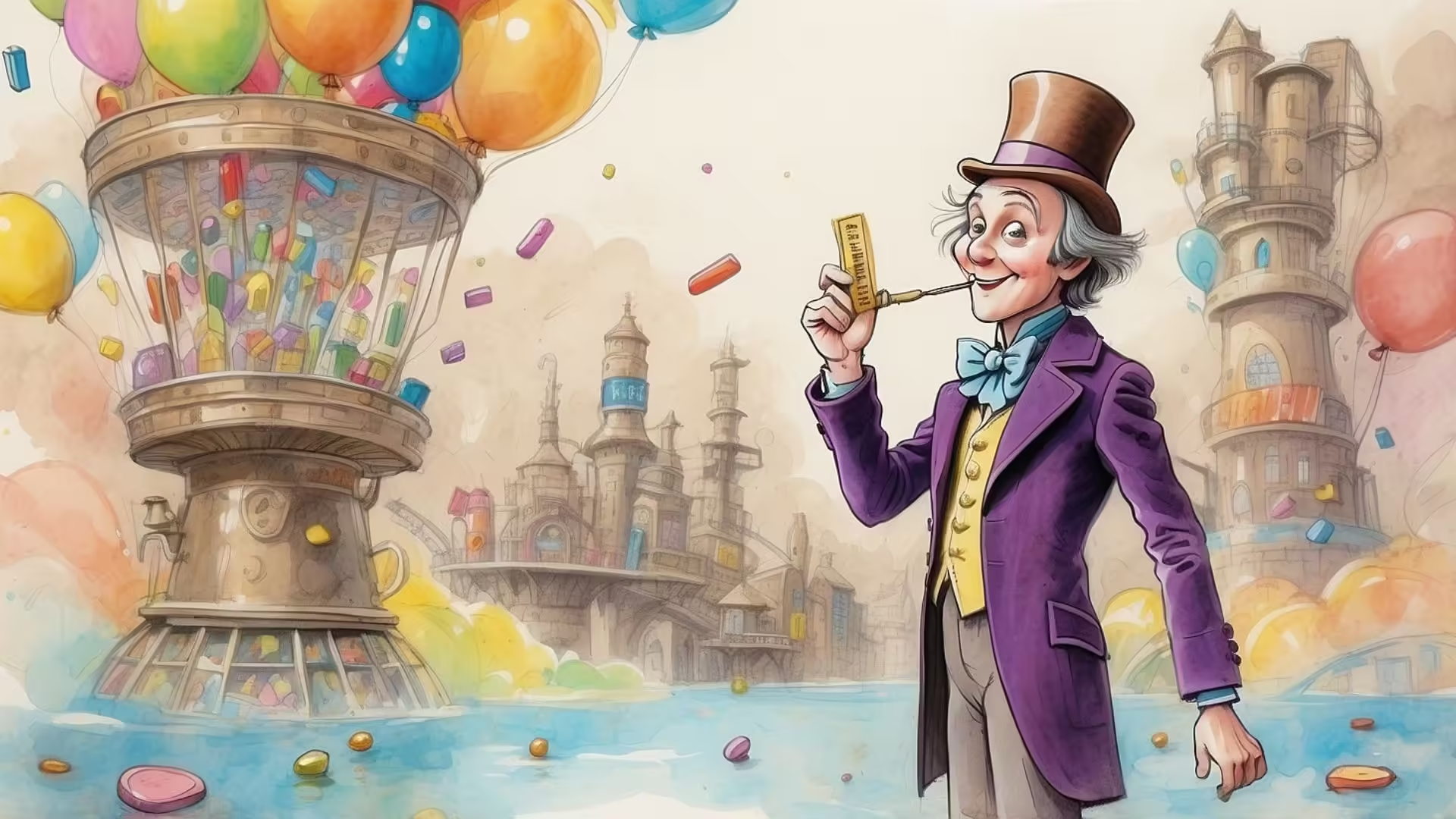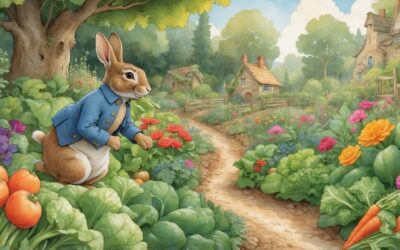The Gist
The Magic of Charlie and the Chocolate Factory by Roald Dahl
Roald Dahl’s Charlie and the Chocolate Factory has captured the imaginations of children and adults alike for generations. First published in 1964, this fantastical story of a poor boy who stumbles upon a life-changing opportunity continues to be one of the most beloved children’s books of all time. But what is it about this book that makes it such a timeless classic? Let’s take a closer look at the magic behind the story and why it resonates with readers of all ages.
The Plot that Draws You In
The story centers around Charlie Bucket, a young boy living in poverty with his family. Charlie’s life takes a turn when he finds one of five golden tickets hidden in Willy Wonka’s chocolate bars. These tickets grant entry into the world’s most famous, and secretive, chocolate factory, owned by the eccentric and mysterious Willy Wonka. The adventure begins as Charlie, along with four other children, enters this magical factory filled with mind-boggling inventions, candy creations, and whimsical workers known as the Oompa-Loompas.
But the journey through the factory is more than just a fun tour—it’s a test of character. Each of the other children, spoiled and selfish in their own ways, faces the consequences of their behavior, leaving Charlie as the last one standing. In the end, Charlie’s humility and kindness win him a prize beyond his wildest dreams: ownership of the chocolate factory itself.
Key Themes of the Story
At first glance, Charlie and the Chocolate Factory might seem like just another fun, lighthearted children’s book, but underneath the candy-coated surface, Dahl weaves in deeper messages about character, behavior, and morality. One of the central themes of the story is the idea of consequences. Each of the children who join Charlie on the factory tour represents a negative trait—greed, gluttony, selfishness, and entitlement—and they all face humorous yet fitting consequences for their actions.
Augustus Gloop’s insatiable appetite leads him to be sucked into a chocolate river, while Veruca Salt’s spoiled demands land her in a pile of garbage. These fantastical punishments not only serve as comic relief but also act as cautionary tales about the dangers of bad behavior.
On the flip side, Charlie’s humility and selflessness stand out in stark contrast to the other children’s flaws. Dahl shows readers that kindness, patience, and a good heart are ultimately rewarded, a theme that resonates strongly with both children and adults.
Willy Wonka: The Enigmatic Figure
At the heart of the story is Willy Wonka, the eccentric chocolatier who is as puzzling as he is captivating. Wonka’s unpredictable nature and mysterious ways add a layer of intrigue to the story, leaving readers to wonder: Is he a mentor, a trickster, or something in between? Wonka’s character serves as a guide through the moral maze of the factory, orchestrating the fates of each child with a mix of whimsy and judgment.
Wonka’s factory is a reflection of his personality—colorful, inventive, and full of surprises. For readers, his world offers a sense of escape and possibility, where the ordinary rules of life don’t apply, and anything can happen. Yet beneath his playful exterior, Wonka is testing the children’s character, and only the one who proves worthy—Charlie—is given the ultimate reward.
A Timeless Message for All Ages
What makes Charlie and the Chocolate Factory so enduring is its universal appeal. On one level, it’s a fun and imaginative story filled with candy, adventure, and humor that captivates young readers. On another level, it’s a moral tale about the importance of kindness, humility, and self-control. These themes resonate with readers across generations, making it a book that can be read and enjoyed at any age.
For adults, the story might bring back a sense of nostalgia, reminding them of the childhood excitement of reading about Wonka’s fantastical world for the first time. For children, it’s a window into a world where anything is possible, where a humble boy can become the owner of the greatest chocolate factory in the world simply by being good.
Cultural Impact and Adaptations
Since its publication, Charlie and the Chocolate Factory has had a lasting impact on pop culture. It has been adapted into two major films—one starring Gene Wilder in 1971 and another starring Johnny Depp in 2005—both of which brought the quirky world of Willy Wonka to life on screen. The book has also inspired musicals, plays, and even a candy line, further cementing its place in literary history.
Dahl’s work continues to be a staple of children’s literature, with Charlie and the Chocolate Factory often being one of the first books introduced to young readers. Its combination of fantasy, humor, and moral lessons ensures that it will remain a favorite for years to come.
Roald Dahl’s Charlie and the Chocolate Factory is much more than a simple children’s story—it’s a tale of imagination, morality, and the unexpected twists life can take when you least expect it. With its timeless themes and unforgettable characters, this book continues to enchant readers of all ages. So, what are your thoughts on the lessons embedded in this sweet adventure? Let’s explore how this great story has impacted not just literature but our views on kindness, humility, and the power of imagination!
Let’s Talk
So, Charlie and the Chocolate Factory—it’s more than just a fun adventure with weird and wonderful candy, isn’t it? It’s a story that kind of sneaks up on you with its deeper messages about character and consequences. What I’ve always found interesting is how Roald Dahl manages to blend all these moral lessons into a narrative that doesn’t feel preachy. Instead, we’re laughing at Augustus Gloop’s chocolate mishap or Veruca Salt’s outrageous demands, but underneath the humor, there’s this quiet message about what happens when you let your worst traits run wild.
Think about it—every single one of the kids besides Charlie is really a reflection of some part of human nature. We’ve all been a little selfish like Veruca or overindulgent like Augustus at some point, right? And Dahl has a funny way of holding up a mirror to those traits, letting us laugh at their ridiculousness while also making us think, “Huh, maybe I should rein that in a bit.” It’s almost like a cautionary tale hidden under layers of candy wrappers.
But here’s what I think makes this story stand out even more—it’s not just about avoiding bad behavior. It’s also about celebrating the quiet virtues like kindness and humility, which are often overshadowed by louder traits in real life. Charlie’s character is easy to overlook at first because he’s not flashy. He’s not demanding the spotlight like the other kids, but it’s his steady, kind nature that ultimately wins the day. That’s such a great reminder for all of us. In a world that sometimes seems to reward the loudest voices, maybe it’s the quieter, more thoughtful actions that matter most in the long run.
And speaking of Willy Wonka, how fascinating is he as a character? He’s both whimsical and a little mysterious, right? One minute he’s cracking jokes, and the next, he’s calmly watching as the kids face their consequences. It’s like he’s both a teacher and a trickster at the same time. Have you ever known someone like that? Someone who challenges you, but you’re not quite sure if they’re helping you learn or just testing you for the fun of it? I think Wonka represents that kind of figure in life—someone who pushes the boundaries of what’s normal and leaves you wondering whether you’ve passed some kind of secret test.
The factory itself feels like a metaphor, doesn’t it? A place where everything is possible, but there’s a hidden order to things. It’s as if Wonka’s factory is a reflection of life’s unpredictability—sometimes things seem random and magical, but there are still rules and consequences, even if they aren’t always obvious at first. You can indulge, explore, and push the limits, but there’s always a moment where the bill comes due, like with Veruca and the squirrels or Violet and her chewing gum.
On a more personal level, this story also makes me think about the role that imagination plays in our lives. As kids, it’s easy to dive into a world of fantasy, but as adults, we often lose touch with that side of ourselves. Have you ever caught yourself thinking, “I used to dream big like that when I was younger”? Wonka’s factory is a great reminder that imagination doesn’t have to disappear as we grow older. It can evolve, taking new forms in the way we approach our work, our hobbies, or even how we solve problems. Maybe we all need a little more of that Wonka-esque creativity in our daily lives, don’t you think?
So, what do you take away from Charlie and the Chocolate Factory? Is there a character you identify with more than others? And how do you think the story’s themes of humility, consequences, and creativity apply to our own lives today? It’s amazing how a simple story about a chocolate factory can stir up so many big questions about how we live and interact with the world. Let’s dive into that, because this story might be a lot sweeter—and more insightful—than we realize.
Let’s Learn Vocabulary in Context
Let’s dive into some of the key vocabulary from Charlie and the Chocolate Factory and see how we can use them in everyday conversation. These words not only shape the story but can help us express similar ideas in real life.
First up is eccentric. In the story, Willy Wonka is often described as eccentric, meaning he’s unconventional or a little odd in a charming or whimsical way. You might use this word when talking about someone who has unique habits or ideas. For example, “My neighbor has an eccentric way of decorating his house—every room is painted a different bright color.”
Then there’s humility, which is what makes Charlie stand out compared to the other children. Humility is the quality of being humble, not thinking you’re better than others, and in the story, it’s Charlie’s humility that helps him win in the end. In everyday life, you might say, “She handled winning the award with such humility, thanking everyone who helped her along the way.”
Consequences is another important word in the story. Each child, except Charlie, faces consequences for their selfish or greedy behavior inside the factory. Consequences are the results or outcomes of actions, often used when something negative happens as a result of poor choices. You could say, “Skipping my study sessions had consequences—I didn’t do as well on the exam as I’d hoped.”
Next, we have morality, which refers to principles about what is right and wrong. Dahl weaves morality throughout the story, showing us what happens when people make poor ethical choices, like Veruca’s spoiled demands or Augustus’s gluttony. In daily conversation, you might use it like, “His decisions always reflect a strong sense of morality—he really cares about doing the right thing.”
And lastly, imagination plays a central role in Wonka’s world. His factory is a testament to what happens when you let your imagination run wild, and it’s this creativity that makes the story so magical. In real life, you could say, “When I’m stuck on a problem at work, sometimes a little imagination is all it takes to find a solution.”
Now, here are a couple of questions to get you thinking: How does humility play a role in your own life, and are there times when it’s been particularly important? And when was the last time you used your imagination to solve a real-world problem or to approach something differently? These words might seem simple, but they can inspire some powerful reflections on how we approach our lives.










0 Comments